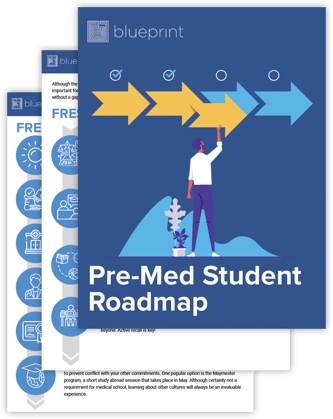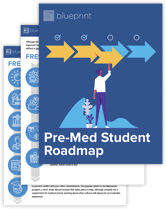The Pre-Med Hub: Resources for First- and Second-Year Students!
Your journey to medical school starts now! From picking the right major to acing the MCAT, our experts are here to help you conquer every step.

Grab Your Free Pre-Med Roadmap
Navigate your path to medical school with this comprehensive guide that explains everything you need to do from your first year through graduation.
The Pre-Med Timeline
What To Do In Year 1 & 2
First
Year

- Focus on your GPA.
- Plan for when you’ll want to take your prerequisites.
- Start thinking about when you want to take the MCAT.
- Determine activities and extracurriculars you want to participate in.
- Develop good study habits
- Start studying for long-term memory
- Don't cram!
Summer Before Second Year

- Pursue activities you’re passionate about and can include in your med school application.
- Demonstrate long-term commitment with activities you can participate in weekly or biweekly for a year or more.
- Must-have activities in a successful med school application: Shadowing and clinical experience.
Second
Year

- Maintain your GPA.
- Continue to volunteer.
- Participate in research projects.
- Deepen your commitment to one or two activities.
- Prioritize finding opportunities to acquire clinical experience.
- Identify and build relationships with potential writers for your letters of recommendation.
Summer Before Third Year

- Familiarize yourself with the MCAT requirements.
- Start looking into MCAT prep
- Assess what MCAT content you’ve covered in your courses and where you need to catch up.
- Consider leadership positions within your student organizations.
- Determine when to contact and follow up with your letter-writers.
- Choose a target MCAT test date and plan your prep accordingly.
- Research your prospective med schools more in depth for specific course requirements.
First Year Student?
Grab Your Free Freshman Resources!
Second Year Student?
Unpack Your Sophomore Success Kit!
Blogs & Posts from Pre-Med Experts

Freshman
MCAT Prep
Know exactly what you need to do and when as you start prepping for the MCAT in your First Year with this freshman MCAT prep action plan.

7 Habits of Highly
Effective Premeds
Get research-backed tips, tricks, and advice to help you thrive as a pre-med college student or professional, with actionable skills you can practice in preparation for your medical school journey.

How to Make Your Experiences As a Pre-Med Count for Your Medical School Application
You’re committing hundreds of hours to volunteering, gaining clinical experience, and taking a full course load. See how to successfully leverage these experiences to go from college freshman to M1!

What to Ask Your
Pre-Med Advisor
Make the most of your meetings with your pre-med advisor when you know the right questions to ask. We have nine questions that can help you tap into your advisor’s expertise.

What College Classes Will Help You on the MCAT?
As a pre-med, you’re balancing a heavy class load. Know which classes can help you the most with MCAT subject areas, so you can focus your energy–and which classes you can stress less!

A Guide to MCAT Topics and Sections
Familiarize yourself with what’s on the test now, so you can start focusing (and saving!) your coursework, notes and resources that can help you later.
Blogs & Posts from Pre-Med Experts

7 Habits of Highly
Effective Premeds
Get research-backed tips, tricks, and advice to help you thrive as a pre-med college student or professional, with actionable skills you can practice in preparation for your medical school journey.

How to Make Your Experiences As a Pre-Med Count for Your Medical School Application
You’re committing hundreds of hours to volunteering, gaining clinical experience, and taking a full course load. See how to successfully leverage these experiences to go from college freshman to M1!

Do I need to know what specialty I want to practice before applying to medical school?
The short answer is no, but we give you the “long” answer, with insights on how honing your interests early can help make you into a more competitive applicant.

How to Have a Great Conversation with Your Premed Advisor
Make the most of your valuable time with your pre-med advisor with tips to help you ask the right questions and focus your conversations.

When to Start Studying for the MCAT
There’s no “one-size-fits-all” formula for figuring out when to start MCAT planning and studying. Here are the top factors you need to consider before deciding when the right time is for you.

A Guide to MCAT Topics and Sections
Familiarize yourself with what’s on the test now, so you can start focusing (and saving!) your coursework, notes and resources that can help you later.
Unlock Even More Undergrad Resources:

“The Pre-Med Journey” Webinar
Learn all the dos and don’ts every first and second-year premed should be aware of, with special guest Dr. Ryan Gray!
-2.gif?width=374&height=210&name=mcat-lol-ali-kat%20(1)-2.gif)
Live MCAT & Admissions Webinars
From MCAT content hacks to crash courses on getting accepted to medical school, get guidance from subject matter experts on how to break into the medical field!

Free Guide: Pre-Med Roadmap
Simplify your journey to medical school with this comprehensive guide that lays out everything you need to be doing every year of undergrad to become a competitive medical school applicant.
FAQ: The MCAT & Med School Admissions
How early should I start studying for the MCAT?
While it’s important to keep the MCAT on your radar, you don’t need to start studying day one as soon as you start college. Once you have time and a target exam date in mind, then you should start building your study plan. For most people, studying for the MCAT is a three-to-six-month endeavor, however individual plans can differ based on how much time per week you can spend studying. No matter how long you choose to study, Blueprint will be there to help you every step of the way!
Do I need to officially declare myself as a “premed ”?
The answer is no, as there’s no required major for med school. What does matter is completing all your prerequisites. That’s why many premeds pursue a major in the biological sciences, as this includes most of the required prerequisite courses and labs. It’s highly encouraged that you look into your preferred med school’s prerequisites to make sure you aren’t missing anything!
